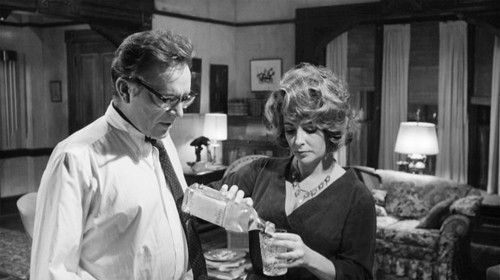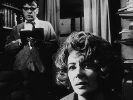Eye For Film >> Movies >> Who’s Afraid Of Virginia Woolf? (1966) Film Review
Who’s Afraid Of Virginia Woolf?
Reviewed by: Jennie Kermode

"I loathe marriage. I hate its smugness, its safety, its compromise," says one of Virginia Woolf's characters in The Voyage Out. It's a position that was close to the author's own heart; she made clear in much of her writing that she resented the fact it was seen as the only way a woman could be fulfilled. Although she doesn't appear in the Edward Albee play that borrows her name, nor in Ernest Lehman's big screen adaptation of it, her presence looms large, and everybody is afraid.
This is a film that opened to great excitement as the play had been a storming success; it featured two of the biggest stars of the day and there was also a delicious hint of scandal about it occasioned by its use of language and innuendo that was right at the limit of what the censors would tolerate - it's actually one of the pivotal works that liberated American filmmakers to pursue more varied directions in the decades that followed. Over those decades, however, Who's Afraid Of Virginia Woolf? has taken on a different and more complex character. It's a film strangely positioned in time; written early in Albee's career, it seems to echo, rather than foreshadow, his later work. Elizabeth Taylor temporarily adopts the appearance which would make her the butt of cruel jokes in the Eighties. She and Richard Burton, still in a happy if volatile marriage just four years after the affair that brought them together on the set of Cleopatra, play a pair of perpetually quarrelling alcoholics like those they would become, yet the chemistry between them enriches the story, hinting at an enduring love with which nothing else has managed to compare.

She plays Martha; he is George. They have been arguing all evening and he's ready for bed, but she reminds him that they have guests coming - young couple Nick (George Segal) and Honey (Sandy Dennis). Both couples are forced into this awkward arrangement; the dance in which they take their positions has been scored by Martha's father, the omnipresent but never present college president whom everybody wishes to please. To make the situation bearable, they drink. Martha, careless of the presence of the others, flirts with Nick, and he can see what sort of opportunity she represents, besides which Taylor has the capacity to be dowdy yet glamorous, crude yet sensual at the same time. This is a career best performance for her, the one which finally announced her presence as a real actress, but it's Burton who is the standout. Hating himself as only Mark Antony could, George responds to Martha's barbs with superlative passive aggression and sometimes with real aggression. The speed with which he can switch between the two disorientates the younger couple and sometimes the viewer, especially once the 'games' begin.
This is a film which one ought ideally to watch in one's twenties and then in one's fifties - rather like Pinter's Sleuth - to get the best of its twin perspectives. Nick and Honey are out of their depth. He doesn't realise it, continuing to try and make the running though George sees him coming every time. She does, and forsakes the intellectual battleground for something more primitive, joyously crying out "Violence! Violence!" as the games take a darker turn. She may not be the deepest character but there's something about her that darkens the mood further: of all of them, she's the best equipped to survive in the wider world, too flimsy to be harmed by the gravity of the situation, her mind possessed of a lower terminal velocity. Nichols, making his debut but already alert to the significance of such women, gives her space to bloom in her own way, where stage directors had not.
Throughout, there is talk of another character, George and Martha's son, so they say, who is perpetually yet vaguely expected to arrive, like David in Hitchcock's Rope; one might say this is a film full of ghosts, but perhaps it's simply indicative of a fear of engaging with the outside wold, a fear strong enough to keep love alive even in the grimmest circumstances. George attempts to strangle Martha. She shrugs it off, and the absence of neighbourly intervention during any of the rows speaks to a simple truth, that everybody around them is used to this. Only Nick is shocked, and perhaps only because that gives him an advantage. When everybody is performing, only old love, however damaged, is real.
Who's Afraid Of Virginia Woolf? shows us a marriage in close-up, both figuratively and literally. There is no sympathetic soft focus here, no forgiveness. By the end, when the lights come up (before the lights come up), the viewer will share that sense of being hung over. Everything is far too clear.
Reviewed on: 11 Feb 2016

















